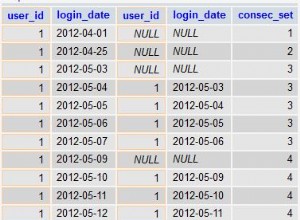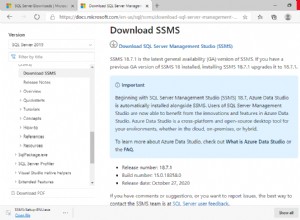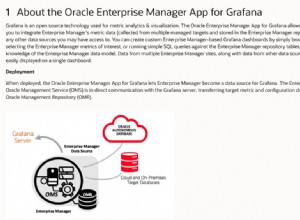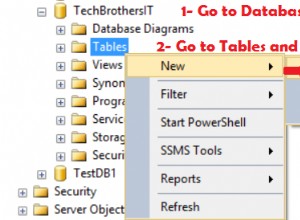Oto przykład tworzenia tabeli z określonymi regułami dla poczty z adresem (regexp). Następnie przykład ze wzorcem zapytania sql (Regexp). Dzięki temu powinieneś być w stanie robić, co chcesz
Utwórz tabelę z wyrażeniem regularnym
create table Contacts (
FirstName nvarchar(30),
LastName nvarchar(30),
EmailAddress nvarchar(30) CHECK (dbo.RegExMatch('[a-zA-Z0-9_\-]example@sqldat.com([a-zA-Z0-9_\-]+\.)+(com|org|edu|nz)', EmailAddress)=1),
USPhoneNo nvarchar(30) CHECK (dbo.RegExMatch('\([1-9][0-9][0-9]\) [0-9][0-9][0-9]\-[0-9][0-9][0-9][0-9]', UsPhoneNo)=1))
INSERT INTO [talend].[dbo].[Contacts]
([FirstName]
,[LastName]
,[EmailAddress]
,[USPhoneNo])
VALUES
('Hallam'
,'Amine'
,'example@sqldat.com’
,'0129-2090-1092')
,( 'encoremoi'
,'nimportequoi'
,'example@sqldat.com'
,'(122) 190-9090')
GO
Wykonaj żądanie sql z wyrażeniem regularnym
SELECT [FirstName]
,[LastName]
,[EmailAddress]
,[USPhoneNo]
FROM [talend].[dbo].[Contacts]
where [talend].[dbo].RegExMatch([EmailAddress],'[a-zA-Z0-9_\-]example@sqldat.com([a-zA-Z0-9_\-]+\.)+(com|org|edu|nz|au)') = 1
Kod funkcji
using System;
using Microsoft.SqlServer.Server;
using System.Text.RegularExpressions;
public partial class RegExBase
{
[SqlFunction(IsDeterministic = true, IsPrecise = true)]
public static int RegExMatch( string matchString , string pattern)
{
Regex r1 = new Regex(pattern.TrimEnd(null));
if (r1.Match(matchString.TrimEnd(null)).Success == true)
{
return 1 ;
}
else
{
return 0 ;
}
}
};




